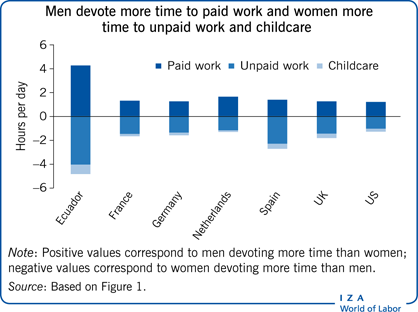Elevator pitch
Many countries experience gender differences, of various magnitudes, in the time devoted to paid work (e.g. market work time) and unpaid work (e.g. housework and childcare). Since household responsibilities influence the participation of women, especially mothers, in the labor market, the unequal sharing of unpaid work, with women bearing the brunt of housework and childcare, is one of the main drivers of gender inequality in the labor market. Understanding the factors behind these gender inequalities is crucial for constructing policies aimed at promoting gender equality and combating gender-based discrimination.

Key findings
Pros
The gender gap in time allocation in both paid and unpaid work has decreased over time in most countries.
An increase in female education has contributed to a narrowing gender gap in paid and unpaid work.
Public policies aimed at increasing female participation in the labor market contribute to closing the gender gap in time allocation.
Increased paternity leave duration and coverage for men may boost participation of men in unpaid work and childcare time.
The use of market substitutes for unpaid work and childcare may decrease the gender gap in time allocation.
Cons
Gender differences in unpaid work and childcare time persist.
Public policies aimed at tackling gender inequality in time allocation mainly focus on labor market aspects, leaving aside unpaid work inequalities.
Gender differentials in unpaid work and childcare caused by social norms are difficult to eradicate.
Household joint taxation may boost specialization within couples, perpetuating the gender gap in paid and unpaid work.
The gender gap in unpaid work limits women’s wages, thereby making it more difficult to increase female participation in the labor market.